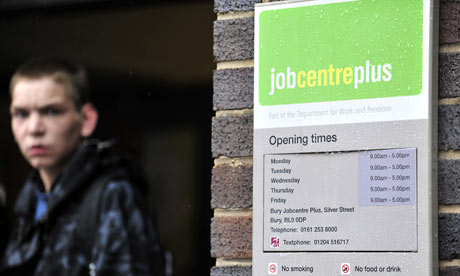Unemployment jumps by record 281,000
The number of people claiming jobseeker's allowance increased by a relatively small 23,800 in June to 1.56 million
- guardian.co.uk, Thursday 16 July 2009 00.32 BST
- Article history

Youth unemployment jumped to a 16-year-high, reaching 726,000. Photograph: Christopher Thomond
The rise took the jobless total to 2.38 million, the highest level since 1995, on the broadest Labour Force Survey measure of unemployment by the Office for National Statistics.
Youth unemployment jumped to a 16-year high of 726,000 after a quarterly rise of 95,000 – the biggest on record – and the number of people out of work for longer than a year rose by 46,000 to 528,000, the highest for 11 years.
The West Midlands was the hardest hit region, with joblessness jumping to 10.3%. The north-east, Yorkshire and Humber, and London were next in line, but the south-east fared best, at 6.1% unemployment.
Brendan Barber, general secretary of the TUC, said the figures were "truly horrendous. It's particularly worrying that over half a million unemployed people have been out of work for at least a year. With a new generation of school and college leavers soon starting to look for work, our unemployment crisis will get even bigger," he warned.
Prof David Blanchflower, the Bank of England's former labour market expert, said: "There is absolutely no sign that the recession is over. It seems to be worsening. There has been a very worrying rise in unemployment amongst the young and they are not eligible for benefits."
He said this was part of the reason why the ONS had reported the smallest rise in unemployment measured on claimants, which rose by only 23,800 in June. Most young people are not eligible for jobseeker's allowance.
The figures also suggested people were coming off the claimant count to go into part-time jobs because they could not find full-time employment. Philip Shaw, an economist at Investec Bank, said the claimant count figures had become unreliable, "biased down by individuals moving off the count on to government schemes such as the New Deal".
Jaguar LandRover announced it will stop producing its X-Type at the Halewood plant on Merseyside, with the loss of up to 300 jobs. David Kern, chief economist at the British Chambers of Commerce, predicted unemployment would peak at about 3.2 million next year.
The figures also showed the number of people in work fell by 269,000 in the latest quarter to 29 million, after a record fall of 0.9% in the employment rate to 72.9%. More than 300,000 people were made redundant in the three months to May, the second highest figure on record, and a rise of 31,000 on the previous quarter. Vacancies fell to a record 429,000 in the three months to June, down by 35,000 from the previous quarter.
Manufacturing jobs continued to fall, down 201,000 over the past year to a low of 2.6 million. Average earnings, excluding bonus payments, increased by 2.6% in the year to May, the lowest figure since comparable records began in 2001, confounding last year's Bank of England prediction that pay deals would soar this year.

No comments:
Post a Comment